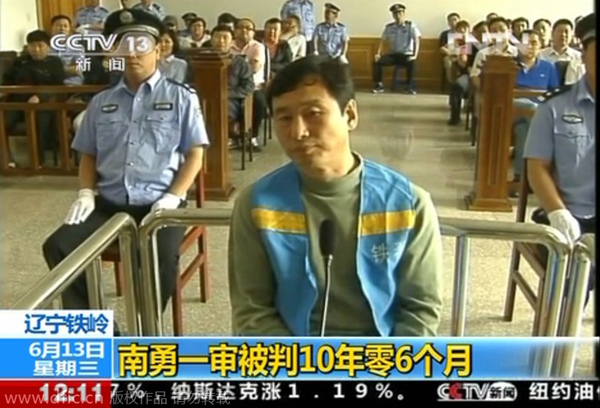|
 |
| Screen shot taken in this June 2012 file photo shows Nan Yong, former head of Chinese football, who was accused of accepting bribes for fixing games, at a court.?Nan was sentenced to 10 and a half years for taking bribes worth more than 1.48 million yuan ($237,500). [Photo/IC] |
With the shadow of match-fixing scandals lingering over Chinese soccer, an anti-graft campaign is targeting the country's top sports body.
The Central Commission for Discipline Inspection of the Communist Party of China, the country's top anti-graft agency, published a commentary on its website on Tuesday in which it criticized the soccer governing body for malpractice for a series of official corruption and game-manipulating scandals. The scandals have tarnished the game's improvement and international image, the CCDI said.
"Chinese soccer remains struggling at a low level after 20 years of professional reform," said the commentary.
It was published on the final day of the 2014 Chinese Super League, the country's top soccer league, which was founded in 1994.
"A series of corruption scandals have disappointed not only ordinary fans but also the country's top leaders," the commentary said.
In early 2012, the Chinese Football Association announced the punishment of 33 individuals, including former top soccer officials, renowned players, referees and 12 clubs involved in match-fixing scandals, after a nationwide crackdown led by the public security department in 2010.
It was the first time that the Party's disciplinary watchdog denounced corruption in soccer following its recent investigation into the General Administration of Sport of China, the country's top governing body for sports.
A number of malpractice cases and violations caused by the body's centralized bureaucracy were discovered during the inspection, according to the CCDI report published on Sunday.
"Some of the processes of sporting event bidding and approval, athlete recruitment and referee appointments were not conducted under open and transparent supervision. Violation of the fair-play principle, such as match-fixing and cheating, remains severe. The GASC-affiliated administrative centers have too much centralized power," the report said.
Experts said the investigation shows that the country's anti-graft campaign has set its sights on the sports field, which used to occupy a minor spot on the top anti-graft radar.
"The sports sector receives huge government funding and resources every year but lacks enough anti-corruption supervision compared with other fields. The water is deep, and it's time for intense scrutiny for potential disciplinary violations," said Yan Jirong, a professor of political science at Peking University's School of Government.
Following its anti-graft procedure, the CCDI sent an investigating group, from July to September, to monitor the operations of GASC and its affiliated event administrative centers, while collecting feedback from the public.
"The CCDI won't send its crew for no reason, nor would the crew finish an investigation without findings. The actions and the issues highlighted in the report suggest that some corruption is about to be exposed," said Yan.
Yan's concern was echoed by media reports on Tuesday that Yu Li, former director of the State Swimming Administrative Center's synchronized swimming department, a GASC-affiliated body, has been taken by the disciplinary authority for investigation on suspicion of accepting bribes and manipulating competition results.
No one of the swimming center was available for further comment by Tuesday afternoon.
According to a China Youth Daily report, Yu had something to do with the controversial officiating at the National Games' synchronized swimming final last year. That event saw the host Liaoning team earn more points than the "virtually better-performing" Sichuan team to win the gold medal, the report said.
Yu responded in a later interview that she didn't think the referees showed partiality in the scoring or that the result was manipulated in favor of the host.
Liu Peng, head of the GASC, said on Sunday that the issues reported by the investigation are "straight to the point" and are "enlightening enough". The GASC would launch a careful self-investigation and punish those who violated discipline and laws, Liu said.
sunxiaochen@chinadaily.com.cn
